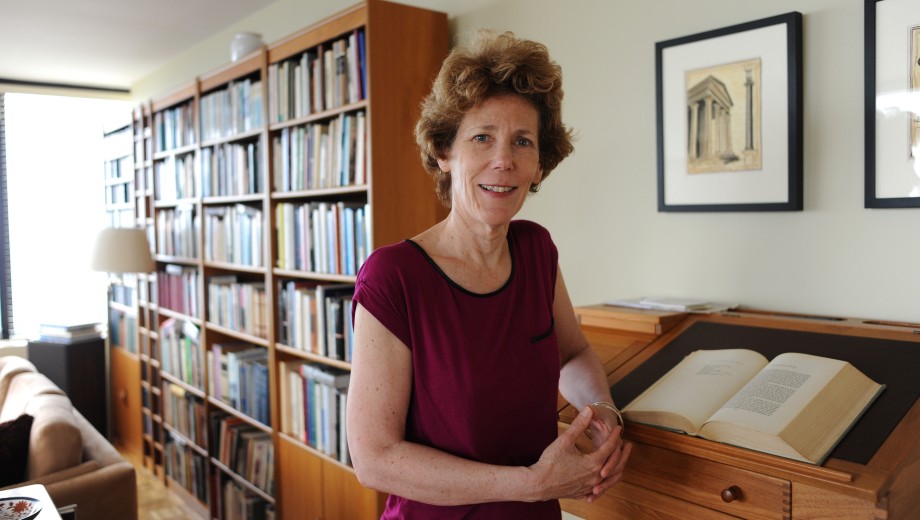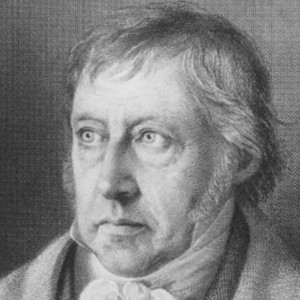Like many American girls, philosopher Sally Sedgwick, AM’81, PhD’85, grew up reading Nancy Drew. By the time she graduated from the University of California, Santa Cruz, she had traded in teen detective mysteries for a different type of puzzle: philosophy. “It’s the same thing, for grown-ups,” says Sedgwick, who was an English major before landing in an intro philosophy class. Intrigued by issues of human reason—and impressed by the intellect of the department’s only female professor—she switched her focus.
Sedgwick, the Liberal Arts and Sciences Distinguished Professor of Philosophy and affiliated professor of Germanic Studies at the University of Illinois at Chicago, has since made a career of deciphering complex ideas. A specialist in the history of eighteenth- and nineteenth-century thought, she investigates the work of German theorists Immanuel Kant and G. W. F. Hegel, the latter of whom Bertrand Russell once described as “the hardest to understand of the great philosophers.”
Sedgwick pieces together Hegel’s scattered clues to make sense of what’s going on in his work—and to persuade scholars to give the notoriously abstract philosopher another look. Her 2012 book, Hegel’s Critique of Kant: From Dichotomy to Identity (Oxford University Press), for example, grapples with gaps Hegel saw in his predecessor’s thought. The journal Mind praised Sedgwick for setting “a new standard for research on the relation of Kant and Hegel.”
*****
Now Sedgwick is focusing her efforts squarely on Hegel, splitting time between Chicago and Berlin on a Fulbright research fellowship to study the role of history in his philosophy. Best known for his 1807 book, The Phenomenology of Mind, Hegel posits a dynamic system of evolving human consciousness. “He strikes people as someone who doesn’t seem to have much contact with the real world,” Sedgwick says, but “most of his major works are written like developmental stories.” Even his writings of logic that deal with pure concepts offer a narrative “suggesting that human reason is now more mature than it was once upon a time.”
Sedgwick cites, for example, our culture’s prevailing notion of human rights. According to this idea, we possess a right, such as the freedom to express an opinion, simply because we are human. Yet that concept didn’t always exist; nor, Hegel argues, was it always an object of human awareness. Rather, it developed over time as we came to perceive inadequacies in our prior conceptions.
When Aristotle presented his theory of natural subordination—the idea that only some individuals were fit to rule and others were born to be slaves—the concept of human rights had yet to appear. According to Hegel, it came about only as we became aware of gaps in past notions of rights and encountered conflicts generated by those conceptions. Hegel outlines this development, Sedgwick says, finding “traces of the idea in the Christian view that each of us is our brother’s keeper” and, later, in the political theories of Enlightenment thinkers such as Locke and Rousseau.
Under Hegel’s approach, concepts like freedom, at first abstract and underdeveloped, become more concrete and nuanced. That said, his work often seems impenetrable. “Some philosophers begin their preface and say, ‘This is the problem I’m working on, and this is the way I’m going to go about solving it,’” Sedgwick says. “He doesn’t. If he does that at all, he does it so obscurely that it takes you 50 years to figure out.” Asked what she would want to know from Hegel if he were alive today, Sedgwick pauses. “I would ask him, ‘Why did you have to make it so difficult?’”
*****
Hegel aside, philosophy was never the easy path for Sedgwick. As a graduate student in UChicago’s Department of Philosophy, she was one of only two women in her cohort—the other dropped out after the first year—and there were no female faculty members. (Today, four of the deparment’s 20 tenure-track faculy members are women.)
Sedgwick credits her adviser, the late Manley Thompson, AB’38, AM’38, PhD’42, an authority on Kant, for taking her seriously in a way many other faculty didn’t. “It’s not as if they were bad guys,” she explains. “In their experience, women were daughters, mothers, lovers. They weren’t philosophers.”
A gender gap still persists in the field. While numbers are increasing, women earned only 31 percent of all philosophy doctorates in the United States, compared to roughly 60 percent in other humanities disciplines, according to 2011 data from the American Philosophical Association’s Committee on the Status of Women. As of 2010, the percentage of women who finished PhDs in philosophy was lower than the percentage for math, chemistry, or economics.
Meanwhile, feminist philosophers have begun to reexamine the field’s conventional thinking. What does it mean to speak of “rational man” or “human dignity” in political philosophy, for example? “Are these ideas themselves gendered?” asks Sedgwick, a past Central Division president of the American Philosophical Association. “From what perspective are we creating our philosophical concepts, and do they reflect the experience of everyone?”
Although feminist philosophy isn’t an area she works in directly (“Kant and Hegel were both big misogynists, just as all philosophers were,” she says), she welcomes its investigations. “One really great thing about philosophy,” Sedgwick says, “is that if it is working correctly, it should wean all of us of the idea that anything is simple.”
Clearly, she’s taken Hegel to heart.
PHOTOGRAPHY BY CHRIS KIRZEDER



Comments
Hegel's accessibility
Thanks for this piece. I'll pass it on to others who have, like me, always thought Hegel, despite the writing, was on to something. Camus once noted that Hegel was one of the few philosophers who rivaled Plato.